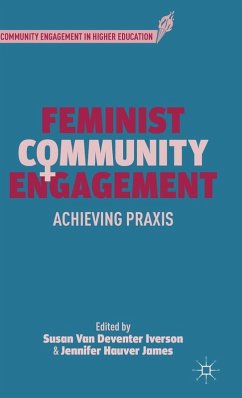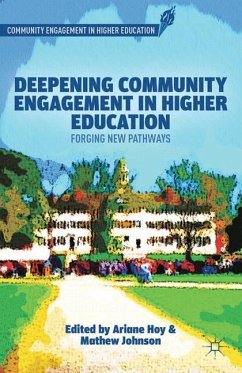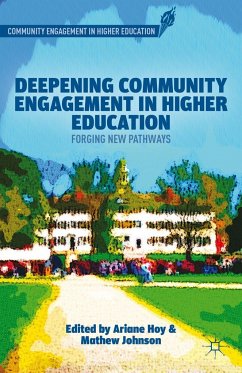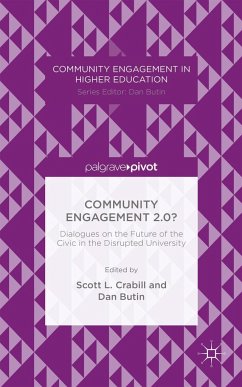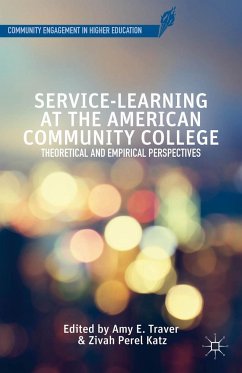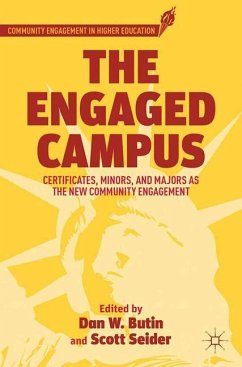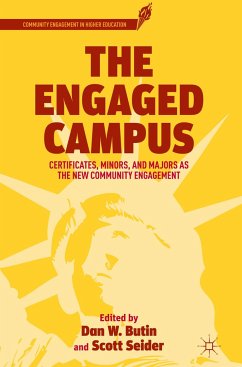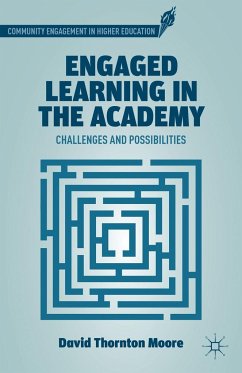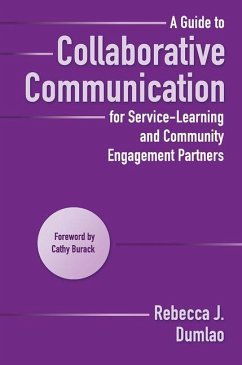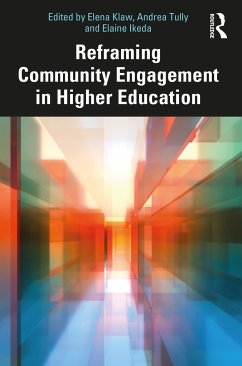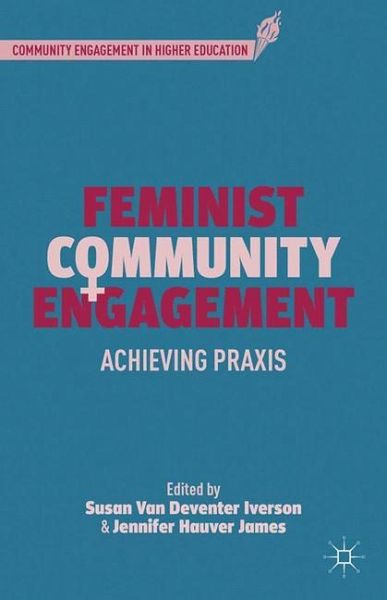
Broschiertes Buch
Feminist Community Engagement
Achieving Praxis
Herausgegeben: Iverson, S.; James, J.
Versandkostenfrei!
Versandfertig in 6-10 Tagen

PAYBACK Punkte
19 °P sammeln!





Contributors to this volume demonstrate how a feminist approach is strategically necessary for the community engagement movement in higher education to achieve its goals and illustrate the transformative potential of merging feminist theory with social action.
Dana Bisignani, Purdue University, USA Shauna Butterwick, University of British Columbia, Vancouver, Canada Angela Clark-Taylor, University of Rochester, USA Heather Crandall, Gonzaga University, USA Carolyn M. Cunningham, Gonzaga University, USA Lamea 'Elle' Shaaban-Magaña, University of Alabama, USA Jasmine A. Mena, University of Rhode Island, USA Melanie L. Miller, University of Alabama, USA Quinlan Mitchell, University of Rochester, USA Jana Noel, California State University, Sacramento, USA Christin Seher, University of Akron, USA Annemarie Vaccaro, University of Rhode Island, USA Begum Verjee, University of British Columbia, Canada
Produktdetails
- Community Engagement in Higher Education
- Verlag: Palgrave Macmillan / Palgrave Macmillan US / Springer Palgrave Macmillan
- Artikelnr. des Verlages: 978-1-349-49472-9
- 1st ed. 2014
- Seitenzahl: 232
- Erscheinungstermin: 19. Dezember 2015
- Englisch
- Abmessung: 216mm x 140mm x 13mm
- Gewicht: 297g
- ISBN-13: 9781349494729
- ISBN-10: 1349494720
- Artikelnr.: 45074011
Herstellerkennzeichnung
Palgrave Macmillan
Tiergartenstr. 17
69121 Heidelberg
ProductSafety@springernature.com
"This innovative collection offers lessons from feminist praxis to demonstrate the collective power of critical community engagement for social justice. Challenging conservative approaches to service learning, the authors share their experiences in promoting social change through activist citizenship, feminist philanthropy, and collaborative action research. The editors deftly weave together a visionary text that should be read by feminist activists and scholars alike." - Nancy A. Naples, Board of Trustees Distinguished Professor of Sociology and Women's, Gender, and Sexuality Studies, University of Connecticut, USA
"Feminist Community Engagement raises significant issues that will cause educators to reflect on and to rethink the teaching, research, and service functions of higher education. Particularly valuable is the constant movement between the description of individual cases and the connection of those cases to larger social structures, with implications not only for the design of community engagement experiences, but also for approaches to teaching and researching critical questions affecting both students and society in the twenty-first century." - Martha C. Merrill, Associate Professor of Higher Education and Coordinator, International Education Certificate, Kent State University, USA
"Feminist Community Engagement raises significant issues that will cause educators to reflect on and to rethink the teaching, research, and service functions of higher education. Particularly valuable is the constant movement between the description of individual cases and the connection of those cases to larger social structures, with implications not only for the design of community engagement experiences, but also for approaches to teaching and researching critical questions affecting both students and society in the twenty-first century." - Martha C. Merrill, Associate Professor of Higher Education and Coordinator, International Education Certificate, Kent State University, USA
Für dieses Produkt wurde noch keine Bewertung abgegeben. Wir würden uns sehr freuen, wenn du die erste Bewertung schreibst!
Eine Bewertung schreiben
Eine Bewertung schreiben
Andere Kunden interessierten sich für




